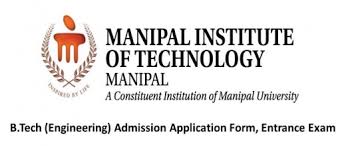Manipal Institute of Technology
|
Section |
No. of Question |
Marks |
|
Physic |
50 |
200 |
|
Chemistry |
50 |
200 |
|
English Proficiency |
30 |
120 |
|
Mathematics |
70 |
280 |
|
Total |
100 questions |
800 Marks |
Note:
- Test Duration: 150 minutes
- Marking Scheme: +4 for every correct answer, -1 for every wrong answer, 0 for every unanswered question
- Student can register for a total of 2 attempts based on Test Centre / Slot availability, best score amongst the attempts will be considered for the ranking
SYLLABUS 2020
PHYSICS
- Units and Measurement
- Kinematics
- Laws of Motion
- Work and Energy
- Motion of System of Particles and Rigid Body
- Gravitation
- Properties of Bulk Matter
- Thermodynamics
- Behaviour of Perfect Gases and Kinetic Theory of Gases
- Oscillations and Waves
- Electrostatics
- Current Electricity
- Magnetic Effects of Current and Magnetism
- Electromagnetic Induction and Alternating Currents
- Electromagnetic Waves
- Optics
- Dual Nature of Radiation and Matter
- Atoms and Nuclei
- Electronic Devices
- Communication Systems
- Experimental Skills
CHEMISTRY
Section-A: Physical Chemistry
- Basic concepts in Chemistry
- States of matter
- Atomic structure
- Chemical bonding and molecular structure
- Solutions
- Equilibrium
- Redox reactions and Electrochemistry
- Chemical Kinetics
- Surface chemistry
Section - B: Inorganic Chemistry
- Periodic properties
- Principles and processes of metal extractions
- Hydrogen
- S-block elements
- P-block elements
- d and f block elements
- Environmental chemistry
- Co-ordination compounds
Section – C: Organic Chemistry
- Purification and characterization of organic compounds
- Basic principles of organic chemistry
- Organic compounds containing halogens
- Organic compounds containing oxygen
- Organic compounds containing Nitrogen
- Polymers:
- Biomolecuels
- Chemistry in everyday life
- Principles related to practical chemistry
MATHEMATICS
- SETS, RELATIONS AND FUNCTIONS
- ALGEBRA
- COORDINATE GEOMETRY, VECTORS AND THREE-DIMENSIONAL GEOMETRY
- CALCULUS
- MATHEMATICAL REASONING
- STATISTICS AND PROBABILITY
- LINEAR PROGRAMMING
ENGLISH
The syllabus will include the following areas: Tense – Use of proper tense and sequence of tense· Modals (have to/had to, must, should, need, ought to and their negative forms)· Subject – verb concord· Pronouns· Sentence structure· Usages in English: Commands and requests, Statements, Questions· Clauses: Noun clauses, Adverb clauses of condition and time, Relative clauses· Determiners/ Use of proper articles· Prepositions· Vocabulary: Synonyms, Antonyms, Spellings, One word substitutions·
Disclaimer: The information provided here is best to our knowledge. It is highly recommended that you should cross-check the source of information through the specific Colleges and Institutes. Career Prabhu Education Pvt Ltd. is in no way responsible for the decisions made solely on the basis of this document.



